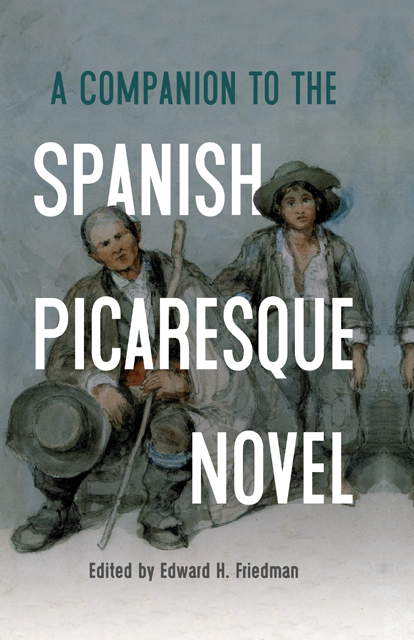Book contents
- Frontmatter
- Contents
- List of Illustrations
- List of Contributors
- Foreword
- 1 The Picaresque as a Genre
- 2 On the Picaresque and Its Origins
- 3 Francisco Delicado, La lozana andaluza
- 4 Lazarillo de Tormes
- 5 Mateo Alemán, Guzmán de Alfarache
- 6 Francisco de Quevedo, La vida del Buscón
- 7 La pícara Justina
- 8 Alonso Jerónimo de Salas Barbadillo, La hija de Celestina
- 9 Miguel de Cervantes and the Picaresque
- 10 Vicente Espinel, Marcos de Obregón
- 11 Carlos García, La desordenada codicia de los bienes agenos
- 12 Estebanillo González
- 13 Critical Approaches to the Picaresque
- 14 The Picaresque in Spanish America
- 15 Continuations: France and England
- 16 The Continuity of the Picaresque: Spain
- Bibliography
- Index
- Tamesis • Companions
16 - The Continuity of the Picaresque: Spain
Published online by Cambridge University Press: 11 January 2023
- Frontmatter
- Contents
- List of Illustrations
- List of Contributors
- Foreword
- 1 The Picaresque as a Genre
- 2 On the Picaresque and Its Origins
- 3 Francisco Delicado, La lozana andaluza
- 4 Lazarillo de Tormes
- 5 Mateo Alemán, Guzmán de Alfarache
- 6 Francisco de Quevedo, La vida del Buscón
- 7 La pícara Justina
- 8 Alonso Jerónimo de Salas Barbadillo, La hija de Celestina
- 9 Miguel de Cervantes and the Picaresque
- 10 Vicente Espinel, Marcos de Obregón
- 11 Carlos García, La desordenada codicia de los bienes agenos
- 12 Estebanillo González
- 13 Critical Approaches to the Picaresque
- 14 The Picaresque in Spanish America
- 15 Continuations: France and England
- 16 The Continuity of the Picaresque: Spain
- Bibliography
- Index
- Tamesis • Companions
Summary
Some later minor works notwithstanding, the 1646 publication of La vida y hechos de Estebanillo Gonzalez (Life and Deeds of Estebanillo Gonzalez) put an emphatic end to the picaresque novel as a historical genre in Spain. The genre that, along with other Spanish narrative forms, had decisively contributed to the inception of the modern Western novel had already started a rapid and remarkable decline in its birthplace, due to a variety of reasons, among which constant reiteration of forms and content, excessive multiplication of characters, places, and incidents, and inflated language (an ever-growing complication of style through endless conceits and witticisms) played an important role. However, the publication of Estebanillo also marked the commencement of a transhistorical continuity in Spanish literature that has oscillated between absence and seemingly inevitable iterations of the picaresque, by now a theoretical genre or artistic mode, in the form of conspicuous residues, resurgences, echoes, and variations.
The permanence and ubiquity of the picaresque in the Spanish imaginary is eloquently revealed by a lexicological event that took place in the eighteenth century, a period in which the enlightened elites in Spain were outwardly at odds with the genre, and with the novel in general, for that matter. The Diccionario de Autoridades (1726–1739), the first dictionary of the Royal Academy of the Language and one of the greatest accomplishments of those enlightened elites, registered the word “lazarillo” as a common noun meaning a “guide to a blind person” and somebody “devious, astute, and recalcitrant.” Before subsequent dictionaries incorporated the words “quixotic,” “donjuanesque,” and their many derivatives, the name of the protagonist of the inaugural or augural picaresque novel had been woven into the fabric of the Spanish language. Meanwhile, in the same Diccionario de Autoridades, the word “picaro” and its derivatives, modestly present in the Tesoro de la lengua castellana by Sebastian de Covarrubias (1611, and with additions by Benito Remigio Noydens, 1674), had grown exponentially, to the point of occupying almost an entire page.
- Type
- Chapter
- Information
- A Companion to the Spanish Picaresque Novel , pp. 181 - 194Publisher: Boydell & BrewerPrint publication year: 2022



